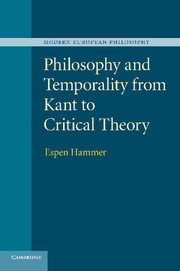Book contents
- Frontmatter
- Contents
- Acknowledgments
- Introduction
- 1 The historicity of time
- 2 Modern temporality
- 3 Two responses to the time of modernity
- 4 Hegel's temporalization of the absolute
- 5 Schopenhauer and transcendence
- 6 Time and myth in the early Nietzsche
- 7 Recurrence and authenticity: the later Nietzsche on time
- 8 Heidegger on boredom and modernity
- 9 A modernist critique of postmodern temporality
- Conclusion
- Bibliography
- Index
Introduction
Published online by Cambridge University Press: 21 April 2011
- Frontmatter
- Contents
- Acknowledgments
- Introduction
- 1 The historicity of time
- 2 Modern temporality
- 3 Two responses to the time of modernity
- 4 Hegel's temporalization of the absolute
- 5 Schopenhauer and transcendence
- 6 Time and myth in the early Nietzsche
- 7 Recurrence and authenticity: the later Nietzsche on time
- 8 Heidegger on boredom and modernity
- 9 A modernist critique of postmodern temporality
- Conclusion
- Bibliography
- Index
Summary
Questions about the nature of time have always puzzled the philosophically disposed mind. What are the essential properties of time? How can we know them? How does time relate to other fundamental features and facts of the universe such as space, conscious life, and the occurrence in it of events and their connections? Does anything exist beyond time? Is, in what may seem like a fleeting sequence of ever passing nows, time a mere succession of discrete moments, or does it harbor a more fundamental continuity? Is time real or in some sense a function of the human perspective? The questions arising from even the briefest and most casual reflection on time are numerous, difficult, and, we tend to think, profound.
Time itself can never be made directly present in experience. Evanescent and intangible to the point of appearing ungraspable, it nevertheless permeates and, in a sense, governs everything that takes place. It dissolves into things, processes, and events as the mode of their becoming, and yet is typically represented by means of space and spatiality, as though time were a mere medium of movement. Our experience of time defies such an easy definition, however, and seems to involve mental abilities such as remembering, synthesizing, and anticipating. As Augustine notes in an often-quoted passage in the Confessions, “I know well enough what [time] is, provided that nobody asks me; but if I am asked what it is and try to explain, I am baffled.”
- Type
- Chapter
- Information
- Publisher: Cambridge University PressPrint publication year: 2011



